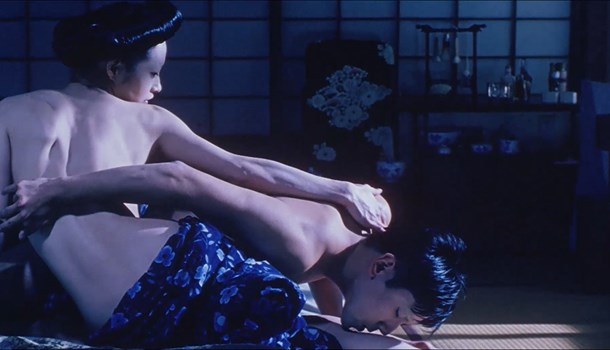
Written by Richard Durrance on 01 Mar 2023
Distributor Third Window • Certificate 15 • Price £15
I have a US DVD of Gemini (1999). I watched it once. I forget when. Why not a second time? No idea. I realised I couldn’t remember the film that well or even my reaction to it. Maybe it’s because Gemini is spoken of in the same sentence as director Shinya Tsukamoto’s second film, Hiruko The Goblin, as being his only films made for a major studio, and Hiruko The Goblin is the only Tsukamoto film I’ve turned off. The studio constraining the director’s energies and talent, creating a forced product – or to paraphrase a description of Wild At Heart, it’s like: Shinya Tsukamoto trying to make a Shinya Tsukamoto film. Anyway, the blu-ray being on sale, I snagged a copy and at the end of a physically and emotionally draining week, having already had a few beers strong enough to knock out a horse I decided to watch Gemini. For me, this is prime cinematic disaster territory: cue impatience or sleep or both, usually in that order – except neither of those happened.
For all Gemini is Tsukamoto’s first period film (being set in the late Meiji period) and a director for hire, it is still pure Tsukamoto. It brings together a skill that first comes to the fore in Testuo II: Body Hammer, his ability to move from kinetic to thoughtfully hypnotic and more importantly his ability to manipulate mood through sound and visual; and this is not even mentioning getting some damn fine performances from the actors. Looking at Tezuka’s Barbara, what Tsukamoto brings to Gemini is exactly what I felt was missing from that film; the capacity for a director to not only visually and stylistically change pace but also to marry depth with it. But I am getting ahead of myself…
War hero Yukio is a local, almost talismanic doctor yet his family home is discomforted by… something unspoken or unknown. Perhaps it’s his amnesiac wife, Rin, of unknown origin. Or perhaps it’s something else entirely, as with the death of his parents Yukio is pushed into a well and his doppelganger takes his place…
Gemini is based on a story by Edogawa Rampo, and in the last few years, often due to Arrow’s releases of films by Teruo Ishii, Rampo adaptions seem to crop up a lot – the best of which was easily Horrors Of Malformed Men and there is a little of that story in Tsukamoto’s Gemini. Apparently the screenplay, also by Tsukamoto, is a loose adaptation of the source story and as the title suggests it is a classic study in duality. What strikes me as remarkable about Gemini is how Tsukamoto so effortlessly manipulates the tone of the film, so that the various elements, some of which are deeply formalised in how they are shot, characters moving with deliberateness can merge into kinetic abandon without either being a jarring presence or undermining the overall feel of the film. There’s something of a tone poem about the film (even if sometimes an anarchic one), frequently the story is suggested through beautiful and striking visuals that are augmented by the performances; for instance the scenes of intimacy between the leads are some of the most impressive I can remember on film, and that intimacy is reflected almost purely visually – and it’s also frequently rendered appropriately disturbing, especially in how the characters are framed. Unease pervades the first half of the film, and though little actually happens, Tsukamoto builds that sense of suppressed agitation and disquiet beautifully. You are aware of things unspoken and perhaps unknown. Yukio describes there being something about his family home that feels wrong, like a splinter under his skin and it’s a testament to Tsukamoto’s skill that in the film you feel it so strongly watching the opening scenes. There are also obvious tensions: Yukio flexing against his family’s traditional values though ultimately succumbing to their social prejudices, especially those hierarchical, dismissing the slum-dwelling poor as barely human; though there are suggestions that Yukio’s actions during the war were morally more flexible than conventional medical ethics allow - something the father definitely disapproves of. Yet the family home and the family itself is a leash, reeling Yukio back in.
The unease finally manifests itself in more traditionally flamboyant Tsukamoto style and though it has an element of shock value, it’s not I think trying to shock the audience but is intended to be a shock to Yukio’s family. Having seen complaints that the film is not scary enough I find this bizarre as I never for a moment think that Gemini is meant to be a terrifying film but a psychological one. The sudden shift from formalised images of the home and sedate family meals to images and camera movements more at home in his earlier films should represent an agonisingly uncomfortable shift in tone within the film but stylistically and narratively it makes sense as Yukio’s double Sutekichi starts to take over Yukio’s life. Also the stylistic conceits are foreshadowed and often in small but hauntingly effective ways, which as always elevate Tsukamoto’s work, where he can even make the shot of the old maid cleaning the floors come across as eerie and disturbing and it’s all done with the camera.
All of this is course emphasised by Tsukamoto’s ever present musical collaborator, Chu Ishikawa, who once again provides a perfect soundtrack that matches the tone of the narrative so that it effortlessly moves between delicacy and the industrial we expect from Ishikawa. Tsukamoto himself – similar to David Lynch – also pays especial attention to sound, and it is often those subtle aural manipulations, in addition to the soundtrack, that reinforces the hypnotic tone of the film. Oddly it was something I witnessed two nights after watching Gemini, in the unusual British road movie, Radio On, where the use of Robert Fripp’s Urban Landscape to underscore late 70s crumbling images of Earls Court, M4 corridor West London and Bristol, which almost cause the images to breathe.
Again, Tsukamoto draws out some superb performances from his small cast. Masahiro Motoki in the dual roles seems to relish the opportunity to move from restrained family physician to the wilder trickster exaggeration of his replacement in the home. Motoki renders both performances distinct, then merges them slowly so that they seem almost one and the same, itself a political stab at Yukio’s inheritance of his father’s disdain for what he sees as slum dwelling poor whose default mode Yukio assumes is animalistic behaviour, something Yukio starts to learn for himself. I felt that Ryo as Rin gave the better performance – and by that I mean the even better performance. It just seemed beautifully nuanced and Tsukamoto tending to write strong female characters as a rule, Ryo seems to embrace the opportunity to embody Rin, who despite the story could be no more than the victim, a plaything between two men seems more in control of their struggles than they are – in a way it reminded me of Tsukamoto’s earlier Tokyo Fist. Unusually, Tsukamoto is not a performer in Gemini, and I expected to miss his presence more than I did. But then except playing the dual role there is no real place for him in the film.
Honestly, there’s little point writing more because Gemini will likely be marmite. Those who love Tsukamoto’s work will likely find it, like me, hypnotic, magnificently filmed, beautifully performed and one where the shifts in tone work in the favour of the narrative and never breaks the trance. It helps as always Tsukamoto never draws a film out and at 85 minutes there’s no fear of it being overlong. Others I think will find it a bizarre mess. True, it’s not quite on the level of A Snake of June… but few films are in my opinion. Nevertheless, it’s still excellent and once again Tsukamoto shows us why he’s one of the most interesting directors on the planet.
What I just cannot now workout is why it didn’t hit me the same way before. Some films grow with you over time or maybe you grow into them, or maybe I was just in the wrong mood all those years ago. In the end it doesn’t matter as I thought Gemini was bloody brilliant and let’s leave it at that.


Long-time anime dilettante and general lover of cinema. Obsessive re-watcher of 'stuff'. Has issues with dubs. Will go off on tangents about other things that no one else cares about but is sadly passionate about. (Also, parentheses come as standard.) Looks curiously like Jo Shishido, hamster cheeks and all.
posted by Richard Durrance on 17 Dec 2025
posted by Richard Durrance on 12 Dec 2025
posted by Ross Locksley on 09 Dec 2025
posted by Richard Durrance on 28 Nov 2025
posted by Richard Durrance on 25 Nov 2025
posted by Richard Durrance on 18 Nov 2025
posted by Richard Durrance on 14 Nov 2025
posted by Richard Durrance on 11 Nov 2025